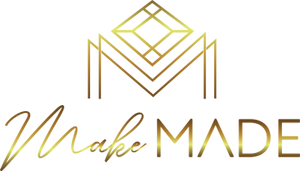Giving a Moissanite Engagement Ring
We've got another great blog post with all the nerdy details about the stone itself if you're interested in that type of thing, but for the purposes of this post, we'll limit the information to what it is about Moissanite that makes it a great contemporary option for an engagement ring.

As an engagement ring center stone, Moissanite is a great choice from an aesthetic and practical point of view. It’s economical, durable, and beautiful. It is as brilliant as a diamond without the expensive price tag.
Moissanite is a man-made diamond alternative that is full of sparkle and fire, and it's almost indistinguishable from a diamond to the naked or untrained eye. If it sounds too good to be true, it sort of is! In addition to its optical qualities mimicking diamond, it's hardness is as close as you can get as well. On the Mohs scale, it's a 9.25, making it the closest non-diamond option available -- ranking slightly higher even than Sapphire (which is itself a satisfactory diamond alternative for an engagement ring).

The only way for you (or, really, your jeweler) to tell that a stone is a Moissanite is to view it under extreme magnification and look for its double refractive quality. Even diamond testers are sometimes unreliable, and many are not smart enough to differentiate a diamond from a Moissanite. As far as the 4 C's of diamond grading goes, Moissanite follows all the same rules.
A newer variation of Moissanite that is worth noting is the recent addition of color. In addition to white, sparkly stones, we can now source beautiful ranges of color -- from icy subtle grays to vibrant turquoise and greens.

Things to Consider when Giving Moissanite as an Engagement Ring
- Moissanites are easy on the wallet. You can purchase a stone for a fraction of the cost of a traditional earth mined OR lab grown diamond. You can also afford a much larger stone because of how inexpensive they are.
- Moissanites are not naturally occuring stones -- they are all lab grown or man-made. Some purists may not like this about them. While they exist out in space, you will never be able to purchase a 'natural' Moissanite as a gem for a ring. It's important that you know how your future fiancée feels about this fact before you commit to a man-made stone.
- Moissanites are NOT the same as other diamond simulants (Cubic Zirconia, etc). They are superior to any other non-diamond alternative in both hardness and optical qualities.
- Moissanites are always beautiful. It’s difficult (impossible, really) to find ugly Moissanites. This is because, as a man-made stone, factories have extremely refined manufacturing processes that ensure the rough produced is top-notch. We simply do not ‘make’ bad stones, because there’s no reason to. As a result, purchasing a Moissanite does not come with the same amount of searching and evaluating as a typical diamond.
- You'll need to always disclose the stone type when having any repairs or work done by a jeweler. Don't expect a jeweler to be able to tell that your stone is not a diamond (many can, but some cannot). It's not unlikely that someone taking in a repair for you may just assume your stone is a diamond (or may not be qualified to tell the difference). Moissanites cannot be treated like diamonds for repair purposes, and can be damaged if you do not disclose this information. Your future fiancée will need to be made aware of this as well, so that no accidents happen.
- Moissanite is socially and environmentally ethical. Moissanite is not mined from the earth and does not disrupt the natural world or habitats. It does not require manual labor, and factories that produce Moissanite are in primarily developed countries with established fair labor practices.
- Repairs might be a little more costly. Because Moissanites cannot withstand some of the same things diamonds can in the repair process, you may be looking at some instances over a ring's lifetime that require taking the stone out and resetting it -- which is less common with traditional diamonds. Many of these same repairs can be done on a diamond without removing it from it's setting.
- Moissanites are not investment stones. We’re not in the habit of selling diamonds as investments, and are more of the opinion that engagement rings are meant to be cherished and passed down, not looked at as something you’ll see a financial return on – but some people do care about the investment value. If you are one of these people, you’ll be happier with a traditional diamond.

